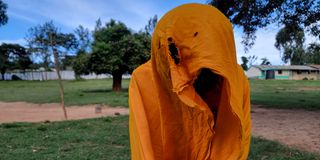Despite HIV diagnosis after defilement, 15-year-old aims for medical school

A ten-year-old Hellen's* life changed forever when her brother-in-law defiled her during a routine family visit to her sister's home in Samburu, leaving her HIV-positive and traumatised.
What you need to know:
- A ten-year-old's life changed forever when her brother-in-law defiled her during a routine family visit to her sister's home in Samburu, leaving her HIV-positive and traumatised.
- Despite her sister's dismissal of the assault and subsequent stigma at school, Hellen, now 15, has found strength through the Samburu Women Empowerment Program.
- Inspired by the healthcare workers who supported her, she dreams of becoming a doctor, even as her mother sells charcoal to keep her in school.
The cool night air whispered through Ledero village in Samburu Central, in Samburu County. Ten-year-old Hellen* lay quietly, wrapped in a thin blanket that did little to ward off the highland chill. She couldn't have known that this ordinary night would forever alter the course of her young life.
In the darkness of the traditional manyatta, where rough-hewn walls should have meant safety, terror awaited. The earthen floor, still warm from the day's sun, bore silent witness as her brother-in-law, a man she had trusted implicitly, committed the unthinkable. That single act of violation would leave her not only traumatised but also HIV-positive, a devastating dual burden for a child to bear.
"He was the last person I ever imagined could harm me," Hellen whispers, her voice trembling with emotion, her hands nervously fidgeting with the edge of her school uniform. "He forcefully assaulted me and shattered my life in one night."
The assault occurred during what should have been a routine visit to her sister's home. Her sister had travelled to a wedding ceremony, leaving Hellen in her husband's care. When she returned and Hellen, despite her fear, found the courage to speak up, her sister's response cut deep: silence and dismissal, a second betrayal that would haunt her as much as the first.
Months passed, and Hellen's body began to betray her. Frequent illnesses led to countless hospital visits, each one adding to her mother's worried frown. The sterile corridors of the local clinic became all too familiar, culminating in the devastating diagnosis that would reshape her world: HIV positive.
"My mother cried," Hellen recalls, tears welling in her eyes as she remembers that day. "I felt like my world had just stopped suddenly. I think I fainted because I don't remember anything after, even how I reached home."
Antiretroviral medication
Now 15, Hellen faces challenges that no teenager should have to endure. The whispers follow her through school corridors, the sideways glances from classmates who learned of her status cutting like invisible knives. Each morning, she swallows her antiretroviral medication along with her pride, determined not to let the virus - or the stigma - define her future.
"Some students stopped talking to me suddenly, while others moved away from me in class," she says. "They side-lined me in their activities. Few people who knew my situation spread word about my status. The isolation feels like a physical weight I carry every day."
Yet amidst the darkness, pinpoints of light emerge. The Samburu Women Empowerment Program, a local support group for survivors of gender-based violence (GBV), has become her sanctuary. In this safe space, surrounded by women who understand her pain, Hellen has begun to find her voice again. Janet Kabugi, the program's founder, works with about 300 survivors across the county, from teen mothers to widows, each with their own story of resilience.
"She is doing well in everything she does," Janet observes, pride evident in her voice as she watches Hellen interact with other survivors. "You can tell her perceptions are changing, and she sounds positive. The spark in her eyes grows stronger with each passing day."
Despite the daily struggle of balancing her antiretroviral therapy with schoolwork and the crushing weight of stigma, Hellen nurtures a powerful dream: to become a doctor. Inspired by the healthcare workers who supported her after her diagnosis, she sees a future where she, too, can heal others.
"I will not give up despite the challenges of school fees," she says with determination, her chin lifted in defiance of her circumstances. "My mother struggles daily to sell charcoal to raise school fees for me. I see her hands, rough and blackened from the work, and it gives me strength. If I manage, I want to help others as a doctor."
Justice remains elusive - her attacker died a year after the assault, taking accountability to the grave. Her sister has vanished, leaving behind only questions and unresolved pain.
"My sister has never returned home after the death of her husband," Hellen says.
"I don't know why, but I think she feels guilty. I don't know where she is, but my mother knows."
The story reflects a broader crisis in Samburu County, where stakeholders report alarming increases in what they call the "triple threat": HIV prevalence, GBV, and teenage pregnancies. The National Syndemic Disease Control Council data shows rising infection rates among adolescents, each statistic representing a story like Hellen's - a life forever altered by violence.
Janet emphasises the urgency of addressing these interconnected challenges.
"We must join hands to save this generation," she insists. "Let stakeholders unite to address this problem affecting Samburu. We have the responsibility to safeguard the future of our children. That's why we emphasise the need to invest in our children's education, which guarantees them a bright future."
In this semi-nomadic community, where child marriage and other harmful practices continue despite awareness campaigns, stories like Hellen's illuminate the human cost of GBV. Yet they also reveal the resilience of survivors who, despite everything, refuse to let their dreams die.
*Name changed to protect identity



